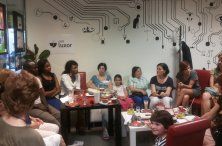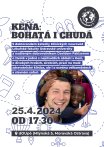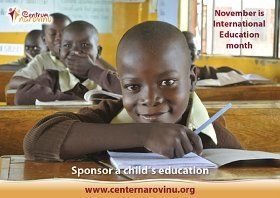The interview with Ken Okongo, Head of Centrum Narovinu in Kenya, given during his visit to the Czech Republic in June.
As we promised in our e-bulletin June issue, here is the full version of our interview with Ken Okongo, Head of Centrum Narovinu in Kenya, given during his visit to the Czech Republic in June.
Do you like your job?
Over ten years is a very long time to be doing something that you don’t like?. I have always enjoyed the activities without a doubt. It gives me the possibility to connect with the realities in our society today.
How does your normal day looks like?
I’m not sure how normal is my normal day? but some very normal days I’m in the office from 8.30am to 5.30 pm or 6pm. Depending in the activities, such days when I’m in the office I will be solving payment issues and meeting beneficiaries coming to the office for some complicated cases that need my attention. Also I take those days in the office in updating legal issues related to the organization if there is need. On other normal days I’m in the field visiting our projects or beneficiary families.
What do you think about the adoption program?
For me adoption program is personal project that changes individual’s life on its own way. In my personal view this kind of project and many others of the same kind are bigger reflection in the failure of the system (political and governance) and justification of the needs of individuals desires to change the systems. Many families in Africa are connected with families in Europe and these connections go beyond the monetary support. The sponsors project the natural innate human feeling to help those in need while the beneficiaries feel connected in the ambit of being wanted and loved by a distant friend.
You are a very busy man. How do you combine work and family life?
The truth is that in the society today living and being busy are synonymous. I have one wife? and two boys and I have managed to split my work time and family time very well. Neither work nor family is complaining?. Though at times it gets hectic with work but somehow I manage?
How do you see the future of this program?
Mmmh….this is difficult to answer?….we support very needy children in the society today…some don’t even have families and we are struggling to find them where to stay….so for me a good future is this project in ideal situation should be a future that we don’t need the project. It means a society that everyone has same and equal access to the basic needs of life…education, healthcare, housing and food. That would be a good future for our project. But what i see more practical at the moment is what I can call a bad future. More and more children need help and we are increasingly having problems on deciding which children to add to the adoption whenever we have the opportunity to put more kids.
You are with our organization from the beginning. How do you remember the beginning? Why and how did you decide to be part of it?
In 2001 I was a college student. Then one day around lunch time as I was leaving the gate for lunch, there were two nice white ladies by the gate trying to contact students for a meeting. I was with a friend called Ben and we decided to approach them. The two ladies introduced themselves as Dana and Simona and they invited us for the meeting. The meetings were based on the activities of Humanist Movement and that time we did not discuss much on projects. With the activities of the Humanist Movement we started to build networks and by 2003 the idea of projects started strongly.
By this time I had finished college and started organizing activities and projects in my home village Rusinga. By 2005 it was clear that the projects were increasingly becoming more and specifically distance adoption was growing very first. That is when the idea of having some few people to help in coordinating the network of the volunteers was born. So Dana and the network of volunteers in Kenya proposed Ben and I to take the responsibility of coordinating the projects. That is how I became part of the organization.
Are you still in touch with the students that have finished their studies, thanks to distance adoption? Did the adoption program help them?
Normally education in Kenya you have three years of pre-primary, eight years of primary school, four years of secondary school and then three or four years of college. When we started most of the students were very young and were just starting school. So meaning just now we are starting to have many students who are finishing the colleges and university. But anyway we have those that started the program when they were already in primary school and many of them have finished college and either working or looking for jobs. We have done some video documentary of such cases that can be watched. Many of the students who are finishing the college well without problems are able to change their lives for the better.
One of the cases is 5051-Daniel Opondo-I helped him join the program when he was 10 years and still at that age he was not able to read and write well because most of the times he was not in school. His performance in school was not that very good and but he put a lot of effort in changing his life. He finished high school and joined college to study social work and community development. Now he works part time with the development NGOs and also as a volunteer with us. For me to see him being able now to manage himself and speak very confidently in English is very touching. I can confidently say that yes at individual levels DA is changing lives of many Kenyans.
Our organization is mainly based on the work of volunteers. Can you tell us something about the coordinators team in Kenya? How it works and how many coordinators do we have?
We work with the volunteers almost in similar way you are organized in Czech Republic. We have a team of fourteen volunteer spread across the country (currently we not present in northern Kenya only). A coordinator is normally helping in reaching all the beneficiaries within his/her neighborhood. Each coordinator and also having a team of volunteers that his helping in coordinating the activities on the ground. The team can from two to five members depending on the number of students in the group. Then in the Nairobi office we have four full time employees. The coordinators are directly in touch with the office in solving issues related to the projects.
The coordinators and their teams are facilitated on their direct expenses like transport and communication. This based on each they are handling. The coordinators and their teams handle all the issues connected with the DA directly with the beneficiaries and then report to the office. We have at least two meetings a year for all the coordinators. At times we do three based on the needs. In one of the meeting normally Dana is present if we have confirmation in time that she is travelling to Kenya. In such meetings we access our progress and challenges. Also we use the meeting at the end of the year to draft the shopping list for the coming year and plan well the activities. We also give summaries of all other projects that we are doing in different places.
What do you think about the visits of adoptive parents in Kenya when they meet with the child?
In my own view the visits are offering more strength to the organization. I’m not sure if there is any other NGO in Kenya doing the same now in Kenya but when we started, we were the only NGO that was allowing sponsors to come and visit the beneficiaries. The visits extend the connection beyond the monetary support. The sponsors get the experience that we are not able to transmit through photos, letters and videos. I have seen sponsor breakdown emotionally after the visits. For the children and the families in Kenya it cements the feeling of family. They feel after this visit that the sponsor is part of their family that they can trust and share their family issues with.
For us that are coordinating the projects also it breaks the walls of doubts for the sponsors and the beneficiaries. At times it creates only issue where we have many different families staying in one place. Once they see a sponsor visiting, they also start asking why their sponsors are not visiting and at times it appears to them that it us in the office deciding which sponsor is visiting?. But In general the visits are something that I can encourage more.
What do you think about the letters and parcel that the adoptive parents send to children? Does it have positive or negative impact?
Letters and parcels also create more connections and for those that are getting them it creates a positive impact. For many families these are the only letters they have ever received. Yes it is true that in the beginning we had issues with families that are not receiving the parcels and they even accused coordinators for not handing over the parcels to them with the view that all the students were receiving parcels and the coordinators were keeping some. We also have administrative challenges that come with the parcels.
Sometimes sponsor are sending very huge packages and we have to pay taxes on them which is becoming expensive. Also I think we should agree on the number of maximum parcels sponsors can send… we had initially suggested that it can be maximum three in one year or one parcel per term. We suggest that also send very small packages that are easy to clear with the customs. For things like clothes, shoes and other items, it is better that the sponsor is sending money through extra payment and we are buying them in Kenya. It is more easy and cheaper this way.
Is there anything you want to tell our adoptive parents and to other people that are helping us?
On behalf of all the beneficiaries of our projects in Kenya I would like to take this opportunity to thank all those that have sponsoring the projects. It is always very humbling for me that we have sponsors who have never been to Africa and maybe don’t even have the plan to come Africa, but they are supporting a child from Kenya. They don’t know them and they are not obliged to support them, but in them they feel the innate urge to support these needy children. These kinds of acts give high sense of humanity. We have been here of course not without challenges but we thank all those that have been patient and listening to us as we always solve unique cases that occasionally arises. We thank you all….Asanteni Sana!!
Is it interesting for you to meat Czech and Slovak adoptive parents? What do you like in such meetings?
It is always very interesting for me to meet the sponsors and be able to share with them our experiences. I always like mostly when they start asking questions…but very simple questions like what kind of food do we eat? Or do you celebrate Christmas? Or do you have winter?
You are not in Czech for the first time. Is there something that you were looking forward to?
Mostly I was looking forward to seeing friends that I have met over these years that I’m coming here and also to enjoy the goulash with dumplings, my favorite Czech food. I also like very much the meetings in schools and the young children when they ask me questions and their imagination about Africa.
You were in Czech three years ago. Do you see some changes?
I’m very sure there have been many changes but for me it is very hard to notice those changes. Czech is a developed country and I was here when there were good roads, electricity and water in all houses, good transport network. So for me everything was there from the time I started coming. This is the difference for Dana and other friends for example who have been visiting Kenya for the last 12 years. they can see better and very easily the changes in Kenya….those days there were no roads for example to my village. It took two days to get there…now you have roads…not complete but almost complete? so we can take 12hrs to get there. There was no even the idea of electricity when she started coming. Over the years there has been idea and finally now we have electric poles around the island. Actual electricity is almost coming?…..so what I mean to say that in the developing countries it is more easy to notice the changes in the materialistic things than in developed countries.
Can you say some words in Czech?
Yes I know some words which are helpful - Dobre rano, Milacek, Dobrou noc, Na zdravi, Pivo, Dobrou chut, Dej mi pusu, Dekuji. And many others…. And I can also combine the words to make statements “Dobre rano milacek.”
























